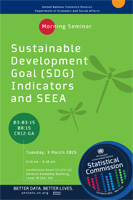|
 |
27 February 2015
 |
SDG Indicators and the SEEA
Tuesday 3 March 2015,
8:15 Ė 9:30 am
Venue: Conference Room 12 (CB)
United Nations, New York
|
The Post-2015 Development Agenda and the Sustainable Development Goals (SDGs) represent a shift in global policy from predominantly economic focus to a more holistic set of goals pertaining to the economy, environment, society and governance. In addition, the SDGs call for a global partnership for sustainable development with the active engagement of governments, civil society and the private sector, pointing in particular to the need to align corporate activity with the goals, targets and indicators of the SDGs.
Calls for decision-making to be increasingly evidence based and sustainably monitored necessitates improvement in the information base used to design policy at all levels. In particular, sustainable development will require an increasingly integrated approach to policy decisions at the national and international level, based on a better understanding of the interactions and trade-offs between different realms of sustainability. Achieving a sustainable global and national economy will also require that when governments, companies and civil society organizations consider their performance and impacts, they adopt a sustainable approach in which they expand their considerations beyond growth and profitability by including considerations for decent work, multidimensional poverty and use of natural resources. Such decision making should therefore be supported by an improved system of information which comprehensively integrates social, economic and environmental information.
To optimize the monitoring process for the SDGs, the monitoring framework employed should be comprised of indicators selected based on their ability to meet minimum requirements ensuring policy relevance, analytical and methodological soundness, and practicality of measurement. The SEEA, adopted as the international statistical standard for the environment and its relationship with the economy, has been recognized as an important tool in this monitoring process for integrating data; both through its capacity to support the derivation of indicators robust to these requirements, and through its role in integrating and streamlining the statistical production process for the more efficient production of environmental-economic indicators at the national level.
Dissemination of official statistics and its integration with non-conventional sources has been identified as an important element of the data revolution. UNEP-Live provides and authoritative platform bringing together official statistics of countries with various global data sources, including from geospatial sources, social media, etc. to support policy makers with timely and disaggregated data. In the same vein, the Big Development Data Shift project launched by Civicus attempts to generate new data using new technology that can be integrated and harnessed by the official statistics. In this context, the SEEA provides a useful guiding statistical framework to organize, integrate and harmonized data generated from these different initiatives.
Optimal monitoring of sustainable development calls for greater integration between measurement of sustainable development on the corporate, national and global level in order to accelerate the transition to a sustainable global economy. There is an opportunity now to align corporate sustainability reporting and accounting with the macro standard in order to inform the Post-2015 development agenda and further support the monitoring of the SDGs.
Jointly organized by UNSD and UNEP
|
| |
| Chair: |
| |
|
 |
Ivo Havinga, Assistant Director, United Nations Statistics Division (UNSD) |
| |
| Panelists: |
| |
 |
Australian Bureau of Statistics, Chair UNCEEA, will present how the SEEA can inform the monitoring of the Post 2015 Development Agenda, presentation  |
 |
Jacqueline McGlade, UNEP Chief Scientist and Director, Division of Early Warning and Assessment will present the UNEP Live platform and discuss how the work on the SEEA implementation can contribute to the initiative, presentation  |
 |
Pietro Bertazzi, Manager Policy and Government Affairs, Global Reporting Initiative will present its initiative on sustainability reporting and efforts to align its reporting with the SEEA. |
 |
Kate Higgins, Strategy and Policy manager, Civicus will present the Big Development Data Shift project and how the SEEA can serve as a guiding framework for the organization of the data, presentation  |
| |
| |
|
|
 |

